For nearly two decades, Jim Killen has served as the science fiction and fantasy book buyer for Barnes & Noble. Every month on Tor.com and the B&N Sci-Fi & Fantasy Blog, Jim shares his curated list of the month’s can’t-miss new SFF releases.
 Amatka, by Karin Tidbeck
Amatka, by Karin Tidbeck
(June 27, Vintage—Paperback)
Celebrated short story writer Karen Tidbeck spins out her dystopian debut novel from a bizarrely exhausting central idea: in distant colonies, every product and object must be named out-loud constantly, or it loses its coherence and turns into a shapeless sludge. Society has become a rigid communist society of strict rules in order to ensure that vital things don’t suddenly melt away—but some remnant of private enterprise remains. Vanja has been tasked with interviewing farmers on bleak, joyless Amatka about the hygiene products they might be interested in buying—but what she finds there challenges her faith in the system of speech that supposedly keeps everything in one piece. It’s a book as strange, imaginative, satirical, and intriguing as that premise promises.
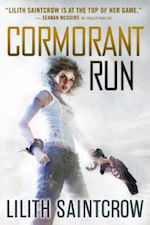 Cormorant Run, by Lilith Saintcrow
Cormorant Run, by Lilith Saintcrow
(June 13, Orbit—Paperback)
After the mysterious Event, rifts opened all over, leading to strange places filled with deadly creatures and inexplicable events. “Rifters” have special skills that allow them to explore the rifts and survive—sometimes. Svinga is released from prison on one condition—she must lead a less-than-harmonious team into the “holy grail” of rifts: the Cormorant, the deadliest and possibly most valuable example of the strange phenomena. Her lover died trying to map it, but that extra knowledge gives her the slightest edge—if she can keep the team she’s guiding in one piece while they traverse the most dangerous place in the universe.
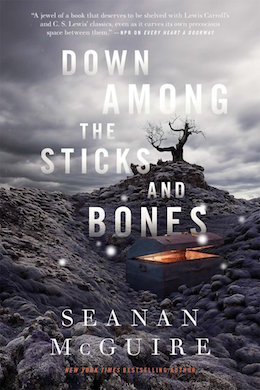 Down Among the Sticks and Bones, by Seanan McGuire
Down Among the Sticks and Bones, by Seanan McGuire
(June 13, Tor.com—Hardcover)
McGuire takes a deeper look at the characters of Jack and Jill Wolcott from last year’s Nebula-winning novella Every Heart a Doorway in this prequel. The twin girls grew up opposites, Jack poised and perfect for their mother and Jill rough and ready for their father—and then they discover their parents’ love is highly conditional and little more than an act. When a mysterious portal to another world appears, they take it without a second though. There, under a blood red moon, Jack is apprenticed to a vampire and seeks immortality while Jill is apprenticed to a scientist named Dr. Bleak, who can reanimate the dead. For the first time in their lives, the choices they make matter, ans the twins discover when Jack, impatient for her chance at forever, does something shocking that forces Jill to choose sides.
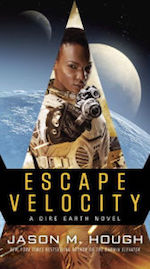 Escape Velocity, by Jason M. Hough
Escape Velocity, by Jason M. Hough
(June 27, Del Rey—Paperback)
Part two of a duology within the Dire Earth series, Escape Velocity finds Captains Skyler Luiken and Gloria Tsandi marooned on the planet Carthage with their crews after a daring maneuver. Separated and scattered, without supplies or reliable communications, they must try to complete their mission of destroying military installations on the surface—and surviving. Luiken and Tsandi started off as rivals, but have learned to work together and trust one another. Unable to communicate to each other their plans, progress, or intentions, that trust will be tested, as they face better-armed enemies on a hostile planet and literally nothing goes as planned.
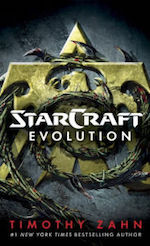 StarCraft: Evolution, by Timothy Zahn
StarCraft: Evolution, by Timothy Zahn
(June 27, Del Rey—Paperback)
Zahn brings his particular brand of genius to the StarCraft universe, spinning out a story in which an uneasy truce between three bitter enemies—the Protoss, the Zerg, and the Terrans—is threatened when a planet thought to have been incinerated is discovered to be completely restored. As diplomacy breaks down and the dominoes start tipping back towards a resumption of the horrific, brutal war, a team of Protoss and Terrans head to the Zerg planet to investigate. What they find redefines the peril the entire sector is facing.
 The Management Style of the Supreme Beings, by Tom Holt
The Management Style of the Supreme Beings, by Tom Holt
(June 20, Orbit—Paperback)
It doesn’t get much more high-concept than Holt’s new novel, in which the Supreme Being—yes, that Supreme Being—and his son decide to retire and move on, taking a host of lesser gods with them (but, as it happens, not all of them—one rotund fellow living in the North Pole stays behind, for example). The new management, the Venturi Brothers, have new management techniques, and abolish good and evil, right and wrong. This doesn’t sit well with everyone—including the jolly guy up north, who’s used to making lists of naughty and nice.
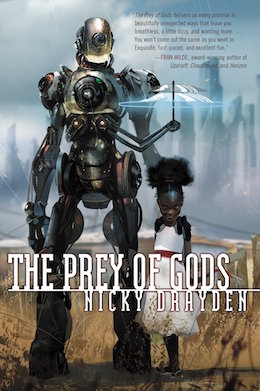 The Prey of Gods, by Nicky Drayden
The Prey of Gods, by Nicky Drayden
(June 13, Harper Voyager—Paperback)
This dense and imaginative debut is set in 2064, in a South Africa much changed from the present. As an ancient goddess concocts a blood-drenched scheme to drum up hatred and violence and reassert her status over humanity, a new designer drug has sparked a process by which everyday people reconnect with ancient, primitive abilities hidden in their DNA, granting them superpowers. It will take a spectrum of evolving humanity and a collective of artificially intelligent, newly sentient, slightly rebellious household machines to come together to fight this new, yet ancient threat to humanity. It’s a book like no other, with a diverse cast that crosses the spectrum of genders and races, and a new idea in every chapter.
 The Rise and Fall of D.O.D.O., by Neal Stephenson and Nicole Gallard
The Rise and Fall of D.O.D.O., by Neal Stephenson and Nicole Gallard
(June 13, William Morrow—Hardcover)
Stephenson and Galland aren’t shy about mixing sci-fi and fantasy tropes; this story includes time travel, sorcery, advanced technology, and shadowy government divisions seeking to bring magic back to the world through the ironic use of advanced technology. At the center of it all is Melisande Stokes, a brilliant expert in ancient languages living an “agreeably uninteresting existence” before she’s recruited by the Department of Diachronic Operations (D.O.D.O.) to translate old documents and report any patterns she notices. Impossibly, the job eventually leads to her being stranded in the 19th century, and Stokes is alarmed to discover that magic worked up until the year 1851, when the industrial revolution tipped the balance and the buzzing frequencies of modern technology blocked it—something D.O.D.O. is determined to change via the liberal altering of history.
 The Waking Land, by Callie Bates
The Waking Land, by Callie Bates
(June 27, Del Rey—Hardcover)
Lady Elanna is the daughter of a disgraced traitor, raised in court as a surrogate daughter of the king. When the king is found dead, her legacy rises against her and she is accused of his murder, forcing her to flee back home—to her real father, to the magical abilities she has always suppressed, and to the strong connection she feels to the natural world around her. Bates’ style is lyrical and elegant, spinning out a mythical tale in a universe where the very forces of nature seem like magic to be controlled.
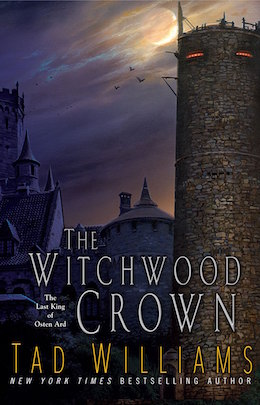 The Witchwood Crown, by Tad Williams
The Witchwood Crown, by Tad Williams
(June 27, DAW—Hardcoverk)
All those who love epic fantasy owe it to themselves to read Williams’ seminal Memory, Sorrow, and Thorn, the classic trilogy introduced the universe of Osten Ard, one of the most detailed, best-realized fantasy settings in the classic vein, complete with ancient evils, dark magicians, and power struggles between princes. The books inspired many of the biggest names in the genre today (including George R.R. Martin), so Williams’ epic-length return to Osten Ard—after tying off loose ends in January’s short standalone novel The Heart of What Was Lost—is one of those rare new books with an ironclad hold on our “must read” lists. The new series focuses on Morgan, son of King Simon (once the scullery boy caught up in events far above his paygrade), and the Norns, who become ever more interesting as Williams teases out their secrets.
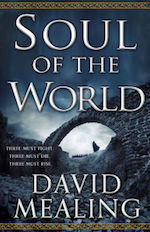 Soul of the World, by David Mealing
Soul of the World, by David Mealing
(June 27, Orbit—Paperback)
Set in a world on the brink of disaster—where starvation fuels rebellion, where new, wild magic challenges the old ways, and total war threatens to destroy ancient empires—three people must master specific magical abilities if there is any hope of saving the world. Sarine has a secret familiar, Arak’Jur wields the strength of animals, and Erris is a soldier with a magical weapon she doesn’t fully understand. As the trio separately struggle to come into their own, a terrifying evil begins to emerge, one that does not want them to succeed.
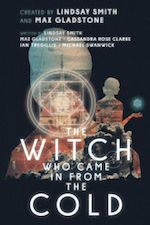 The Witch Who Came in from the Cold, by Lindsay Smith, Max Gladstone, Cassandra Rose Clark, Ian Tregillis, and Michael Swanwick
The Witch Who Came in from the Cold, by Lindsay Smith, Max Gladstone, Cassandra Rose Clark, Ian Tregillis, and Michael Swanwick
(June 13, Saga—Paperback)
Originally a serial novel penned by five familiar fantasy authors, this volume collects the whole story of a second, secret Cold War occurring parallel to the one we remember. As the East and West play political and military chess, the magical factions known as the Ice and the Flame work against each other just as covertly. American spy Gabe Pritchard and Soviet agent Tanya Morozova stumble onto a gathering of Flame forces in 1970s Czechoslovakia and a potential defector who challenges their loyalties and belief systems, setting off a chain reaction that rivals any spy thriller for sheer twists and turns—all, of course, with the fate of the world hanging in the balance.
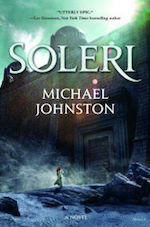 Soleri, by Michael Johnston
Soleri, by Michael Johnston
(June 13, Tor Books—Hardcover)
With a grounding in real history and myth, Johnston creates a fantasy world built on realistic premises taken to epic conclusions. The Soleri Empire controls its vassal kingdoms via the reliable and effective practice of hostage-taking, requiring the leaders of client nations to send their children or equally important personages to the imperial court. In this first book of a new series, King Arko Hark-Wadi learns the consequences of not serving as a hostage as a youth when he is ordered to court just as his son returns—a trip he will undoubtedly not return from alive. As his kingdom is threatened by a rivalry between his daughters, his wife—an ambitious high priestess seeking to consolidate her power while dealing with a mysteriously failed sacred grain crop—plays the great game of politics. As the Soleri is revealed to be rotten and unstable, the tension rises and the characters deepen.
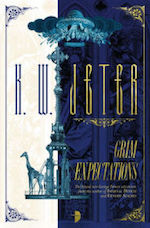 Grim Expectations, by K.W. Jeter
Grim Expectations, by K.W. Jeter
(June 6, Angry Robot—Paperback)
Set some undefined length of time after Fiendish Schemes, Grim Expectations finds George Dower at Miss McThane’s deathbed. Before she passes, she gives him a strange, ticking box. After she dies, the box stops ticking, and opens to reveal letters, written in handwriting he doesn’t recognize, and addressed to a mysterious “S.” The letters tell the tale of the search for a mysterious person—and the last one says, simply, “Found him.” Returning after decades to complete the trilogy that defined steampunk, Jeter explores the darkest corners of a universe both very different and yet familiar to the denizens of this continuity, until all the weirdness comes to the fore.
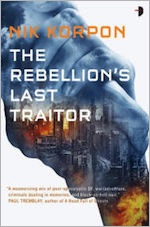 The Rebellion’s Last Traitor, by Nik Korpon
The Rebellion’s Last Traitor, by Nik Korpon
(June 6, Angry Robot—Paperback)
In a future devastated by war and environmental disaster, order is maintained in Eitan City by the ruthless Tathadann Party. The Tathadann employ memory thieves to drain people’s minds, allowing them to control the populace by controlling what they remember. Henaek is a memory thief with a tragic past—and when he discovers a memory of his wife’s death in the chaotic rebellion that once inflamed the city, he sets off to find the truth, even if doing so requires him to destroy the delicate balance of order that holds the city together.
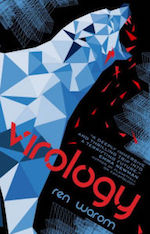 Virology, by Ren Warom
Virology, by Ren Warom
(June 13, Titan—Paperback)
The sequel to Warom’s Escapology finds elite hacker-cum-recovering addict Shock Pao back in the virtual world of The Slip—which he’s recently taken control of. All this really means, however, is that Pao is hiding, on the run for his life from the worst of the worst in Foon Gung. At the same time, the mysterious disease crippling Patient Zero gets worse. Pao and his Hornets must look skyward, to the cities sent into orbit, and flee Tokyo for New York. Warom threads themes of addiction and recovery through a cyberpunk story sans limits—and never lacking in bald ambition.
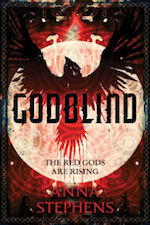 Godblind, by Anna Stephens
Godblind, by Anna Stephens
(July 11, Talos—Hardcover)
The realm of Rilpor exiled the Mireces centuries ago, and they have worshiped the bloodthirsty Red Gods in the harsh environment of the mountains ever since. Dom Templeson is a Watcher for Rilpor, a powerful seer who can’t control his visions and who uses his power to defend the border. Templeson is troubled by the increasing worship of the Red Gods within Rilpor itself, as civil war and political strife continue to rise. His own faith in the gods of light is tested when an escaped Mireces slave named Rillirin comes into his life. She has inside knowledge of the Mireces King and his plans, but with war all but inevitable and Templeson plagued by doubt, it may not be enough to prevent disaster in this brilliantly bloody dark fantasy debut.
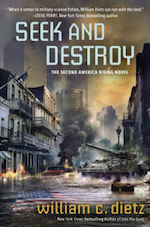 Seek and Destroy, by William C. Dietz
Seek and Destroy, by William C. Dietz
(June 20, Ace—Hardcover)
Dietz’s second America Rising novel dives back in to a world sent spiraling into chaos by a catastrophic meteor shower and a country gripped by ruthless civil war. As president Sloan struggles to hold the Union together and the New Confederacy tries to establish a new world order based on profit and power, Union Army Captain Robin Macintyre is ordered to put down a rogue ex-Green Beret who has made the West his personal domain. When Mac discovers he’s being assisted by none other than her own sister, Confederate Major Victoria Macintyre, the confrontation is inevitable. When it comes in the streets of war-torn New Orleans, it’s a fight to the death—even as the larger conflict rages around them.
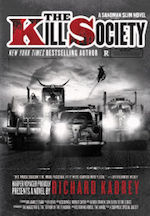 The Kill Society, by Richard Kadrey
The Kill Society, by Richard Kadrey
(June 6, Harper Voyager—Paperback)
Waiting to find out what Sandman Slim has been up to since being murdered? Wait no more. Kadrey returns everyone’s favorite half-angel assassin to hell—or at least, a subset of hell known as the Tenebrae, a barren desert fought over by gangs of the damned, where Slim smartly decides to go undercover, joining a gang only to discover its leader has devastating plans for heaven itself. Even though all he wants is to get back to his girlfriend and get out of hell (naturally enough), things aren’t going to be that easy for Slim—as usual.
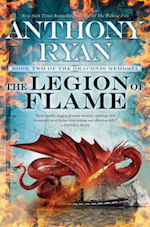 The Legion of Flame, by Anthony Ryan
The Legion of Flame, by Anthony Ryan
(June 27, Ace—Hardcover)
The second book in Ryan’s Draconis Memoria series finds the world in chaos as a society built on the magical powers conferred on the Blood-Blessed—those able to consume drake’s blood without burning—deals with the rise of the most powerful drake ever known. A rag-tag group of adventurers—a Blood-Blessed, an agent of the Trading Syndicate, an Ironship Captain—set off, following clues to a possible way to defeat the fearsome creature, exploring a world fragmenting into revolution under their feet, and giving Ryan room to explore his detailed steampunk-meets-pirate adventure universe to his heart’s content.
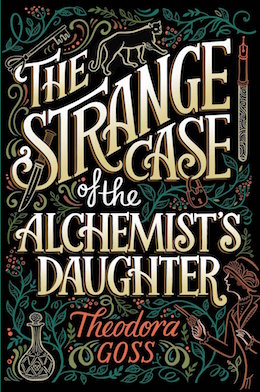 The Strange Case of the Alchemist’s Daughter, by Theodora Goss
The Strange Case of the Alchemist’s Daughter, by Theodora Goss
(June 20, Saga—Hardcover)
In a brilliant mash-up of classic horror and sci-fi tales and characters, with an added steampunk twist, Goss’s debut novel expands on an earlier short story to tell the tale of Mary Jekyll, daughter of the famed Dr. Jekyll. Impoverished, she hires detective Sherlock Holmes to track down the man who murdered her father—the monstrous Mr. Hyde. Holmes is distracted by the serial killings in Whitechapel, a parallel investigation that leads both him and Mary to other daughters of infamous men: Diana Hyde, Beatrice Rappacini, Catherine Moreau, and Justine Frankenstein. With an unwaveringly entertaining narrative voice, Goss imbues each woman with agency and personality, crafting a story in which each can pursue her own destiny as they wrestle with their singularly odd pasts and odd families.
 The Asylum of Dr. Caligari, by James Morrow
The Asylum of Dr. Caligari, by James Morrow
(June 20, Tachyon—Paperback)
Morrow crafts a plot that takes every unexpected twist and turn possible in less than 200 pages. It starts with the quietly mediocre farm boy Francis Wyndham, and his life-changing visit in 1913 to an exhibition of modern art. Wyndham heads to Paris and sets himself up as a North American gypsy folk artist. He fails to get much attention for his work, but is offered a job at an art therapist at an asylum run by the mysterious Dr. Caligari. Wyndham soon learns that Caligari viewed World War I as a work of art, and has created a painting imbued with strange and disturbing powers that can drive anyone who looks upon it to do his bidding. Wyndham finds it’s up to him—and a ragtag bag of misfits—to fight back against the doctor’s monstrous plans to profit at the world’s expense.
 The Day After Gettysburg, by Robert Conroy and J.R Dunn
The Day After Gettysburg, by Robert Conroy and J.R Dunn
(June 6, Baen—Hardcover)
Fans of Conroy’s legendary alternate histories will be thrilled to see his last, unfinished novel published with the assistance of historian J.R. Dunn. In this suitably imaginative final work, Conroy wonders what might have happened if General Robert E. Lee hadn’t retreated after the Battle of Gettysburg, but attacked the North instead. The result of this bold stroke is a resurgent Confederacy firmly planted in Pennsylvania, and a rippling in the warp and weft of history, influencing the fate of a certain actor named Boothe who moves up—and unexpectedly alters—his plans for a certain president. Discovering what’s changed is, of course, half the fun, but Conroy also can’t be beat for his attention to detail, creating a past that feels well-worn and dust-caked.
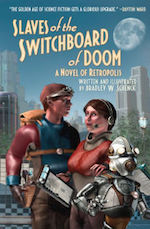 Slaves of the Switchboard of Doom, by Bradley W. Schenck
Slaves of the Switchboard of Doom, by Bradley W. Schenck
(June 13, Tor—Hardcover)
Luxuriating in a retro sensibility that evokes the Art Deco designs of classic SF like Metropolis and old Buck Rogers serials, Schenck combines his iconic artwork with a rousingly old-school adventure set in the city of Retropolis, filled with pneumatic tubes and flying cars, rayguns and not-so-giant robots. When every single switchboard operator in the city’s information center is fired, Kevin “Dash” Kent is hired by Nola Gardner to find out why she lost her job. The adventure drills deep into the very weird center of the city, where a conspiracy of truly mad science is waiting to be revealed.
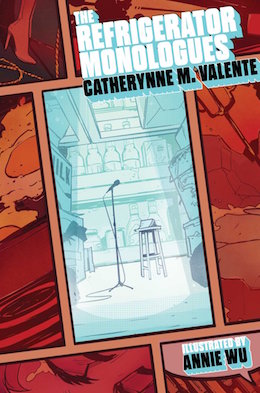 The Refrigerator Monologues, by Catherynne M. Valente, illustrated by Annie Wu
The Refrigerator Monologues, by Catherynne M. Valente, illustrated by Annie Wu
(June 6, Saga Press—Hardcover)
Women characters have made tremendous strides in superhero fiction in recent years, but far too often they’re still appendages: aunts, girlfriends, wives, and one-note villains who don’t serve any purpose beyond advancing the story of the male leads, often by dying (or worse). That’s the attitude Catherynne M. Valente is taking aim at in her very dark, but very funny satire of the girlfriends-in-jeopardy school of comics writing. In the appropriately named “Deadtown,” female superheroes and sidekicks live on after ignominious deaths to tell their stories. It’s uncompromising in its (deservedly savage) critique of the ways in which female characters are written in pop culture, with parallels to some of the most iconic stories in comic history. It holds together beyond the meta, though, in creating a set of interconnected stories that are fun, funny, and heartbreaking.
This post was published simultaneously on the B&N Sci-Fi and Fantasy Blog.










